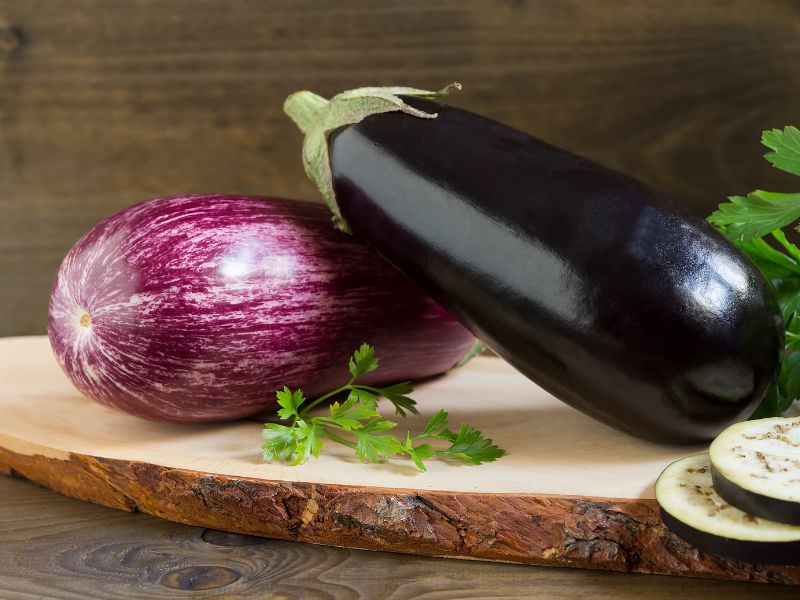Eggplant is a versatile and delicious vegetable that can be used in a variety of dishes, from classic Italian dishes like eggplant parmesan to Middle Eastern dips like baba ghanoush. However, sometimes we end up with more eggplant than we can use right away.
If you’re wondering whether you can freeze eggplant, the answer is yes! Freezing eggplant is a great way to extend its shelf life and reduce food waste. In this article, we’ll show you how to properly freeze eggplant and offer some tips on how to use it after thawing.
Preparing Eggplant for Freezing
The first step to freezing eggplant is to properly prepare it. Here’s what you’ll need to do:
Selecting the Right Eggplant
When selecting eggplants for freezing, it’s best to choose ones that are ripe but not overly mature. Look for eggplants that are firm and shiny with smooth, unblemished skin. Avoid eggplants that are soft or have spots, bruises, or signs of decay.
Washing and Cutting the Eggplant
Before freezing, it’s important to wash and cut the eggplant into the desired shape. You can cut the eggplant into slices, cubes, or chunks, depending on how you plan to use it later.
Pre-cooking the Eggplant
For the best results, it’s recommended to pre-cook the eggplant before freezing. Pre-cooking will help to prevent the eggplant from becoming mushy or discolored during the freezing and thawing process. There are several methods for pre-cooking eggplant, including:
- Blanching: Blanching involves briefly boiling the eggplant in salted water for 3-4 minutes, then immediately transferring it to a bowl of ice water to stop the cooking process. This method works well for slices or cubes of eggplant.
- Roasting: Roasting involves cutting the eggplant into slices or chunks and then roasting them in the oven for 20-30 minutes until they are tender and golden brown.
- Sautéing: Sautéing involves cooking the eggplant in a skillet with oil over medium-high heat until it is tender and lightly browned.
Freezing Techniques for Eggplant
Once the eggplant is prepared, it’s time to freeze it. Here are some tips for freezing eggplant:
Choosing the Right Container
When freezing eggplant, it’s important to choose a container that is airtight and freezer-safe. You can use freezer bags or containers, but be sure to remove as much air as possible to prevent freezer burn.
Tips for Packing and Labeling
Before freezing, make sure to label the container with the date and contents. It’s also a good idea to portion the eggplant into smaller containers so that you can thaw only what you need.
Different Methods for Freezing Eggplant
There are several methods for freezing eggplant, including:
- Flash freezing: To flash freeze eggplant, spread the pre-cooked slices or cubes on a baking sheet and freeze for several hours until they are firm. Then transfer the eggplant to a freezer bag or container.
- Container freezing: To container freeze eggplant, pack the pre-cooked slices or cubes into a freezer-safe container, leaving some space at the top for expansion. Seal the container and freeze.
Thawing and Using Frozen Eggplant
Once you’re ready to use your frozen eggplant, it’s important to thaw it properly. Here are some tips for thawing and using frozen eggplant:
Proper Techniques for Thawing
To thaw eggplant, remove it from the freezer and place it in the refrigerator for several hours or overnight. You can also thaw it more quickly by placing the frozen eggplant in a bowl of cool water.
Be sure to change the water every 30 minutes until the eggplant is thawed. Never thaw eggplant in the microwave or at room temperature, as this can promote bacterial growth and spoilage.
Tips for Cooking with Thawed Eggplant
Thawed eggplant can be used in a variety of dishes, such as stews, casseroles, and stir-fries.
Here are some tips for cooking with thawed eggplant:
- Squeeze out excess moisture: Thawed eggplant can be quite watery, so it’s important to squeeze out any excess moisture before using it in a recipe. Simply place the thawed eggplant in a colander and press down with a paper towel or clean dish towel to remove any excess liquid.
- Use in cooked dishes: Thawed eggplant is best used in cooked dishes, as it can become mushy if used in raw dishes like salads or dips.
- Add at the end of cooking: To prevent the eggplant from overcooking and becoming mushy, it’s best to add it to a recipe towards the end of the cooking process.
Recipe Suggestions for Using Frozen Eggplant
Here are some recipe ideas for using frozen eggplant:
- Eggplant parmesan: Layer slices of thawed eggplant with tomato sauce and cheese, then bake until bubbly.
- Eggplant curry: Add thawed eggplant to a simmering curry sauce and cook until tender.
- Eggplant lasagna: Layer thawed eggplant slices with lasagna noodles, ricotta cheese, and tomato sauce, then bake until bubbly.
Benefits of Freezing Eggplant
Freezing eggplant has several benefits, including:
Longer Shelf Life and Reduced Waste
By freezing eggplant, you can extend its shelf life and reduce the amount of food waste in your household. Frozen eggplant can last up to 8 months in the freezer, which means you can enjoy eggplant even when it’s out of season.
Convenient for Meal Prep
Frozen eggplant is a convenient ingredient to have on hand for meal prep. You can easily thaw and use it in a variety of dishes, which can save time and make cooking easier.
Cost-Effective
Freezing eggplant can also be a cost-effective way to enjoy this delicious vegetable. By buying fresh eggplant in bulk when it’s in season and freezing it, you can save money and enjoy eggplant all year round.
Precautions and Warnings
While freezing eggplant is generally safe, there are some precautions and warnings to keep in mind:
Risks of Improper Storage
If eggplant is not properly stored in the freezer, it can develop freezer burn or become contaminated with bacteria. To prevent this, be sure to use airtight and freezer-safe containers and label them with the date and contents.
Signs of Spoiled Eggplant
If frozen eggplant has been stored for too long or has been improperly thawed, it can become mushy, discolored, or develop an off odor. If you notice any of these signs, it’s best to discard the eggplant and not use it.
Precautions for Food Safety
To prevent foodborne illness, it’s important to follow proper food safety practices when handling and cooking eggplant. Always wash your hands and any surfaces or utensils that come into contact with raw eggplant. Cook eggplant to an internal temperature of 165°F to kill any harmful bacteria.
Conclusion
In conclusion, freezing eggplant is a great way to extend its shelf life and reduce food waste. By properly preparing and storing eggplant, you can enjoy this delicious vegetable all year round. Be sure to follow proper thawing and cooking techniques and always practice food safety to prevent any potential risks.
Frozen eggplant is a convenient ingredient to have on hand for meal prep and can be used in a variety of dishes. By squeezing out excess moisture and using it in cooked dishes towards the end of the cooking process, you can enjoy the texture and flavor of thawed eggplant.




